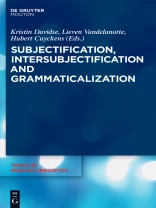This volume aims to arrive at a fine-grained and grammar-based understanding of the notions of (inter-)subjectivity and (inter-)subjectification in their application to grammaticalization research. In terms of linguistic theory, position is taken vis-à-vis existing approaches to (inter-)subjectification which are either too narrow or too general by addressing two questions: (i) what is the relation between (inter-)subjectivity and pragmatics, and (ii) on what grounds can subjective and intersubjective meanings be distinguished?
In the descriptive sections of the volume, these theoretical considerations are confronted with extensive analytical, and often also quantitative, study of empirical data mainly from English but also from Romance languages. The focus in these case studies is on the analytical and diachronic relations between subjectivity and intersubjectivity, with particular emphasis on the question how linguistic syntagms may shift towards the expression of meanings of which the hearer is an essential part. The domains covered include adverbials and modals, but also the noun phrase, to date a relatively under-researched area in grammaticalization studies. Together these three areas ensure broad verification of existing hypotheses about the relative order in which subjectification and intersubjectification take place.
This volume is mainly of interest to researchers and graduate students with a special interest in subjectification, intersubjectification and grammaticalization, and with a general interest in language change. The volume will also be welcomed by functional linguists (in a broad sense), since it is the first to bring eclectic functionalists‘ reflections to bear so explicitly on grammaticalization.
Über den Autor
Kristin Davidse, Katholieke Universiteit Leuven, Belgium; Lieven Vandelanotte, FUNDP – University of Namur, Belgium; Hubert Cuyckens, Katholieke Universiteit Leuven, Belgium.












